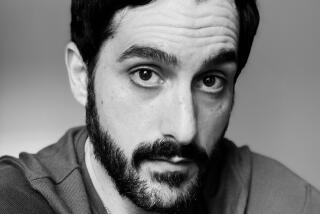Cannes 2017: A new film slyly critiques Russia (just don’t tell the director)
Reporting from CANNES, FRANCE — “Loveless,” a new film about the failed institutions in and of the Russian state, couldn’t be more timely.
And since it comes from Andrey Zvyagintsev — whose 2014 drama “Leviathan” was a subtle but blistering indictment of his country’s government — you could be forgiven for reading its many symbols and overtones as political.
Just don’t ask the director to confirm any of that.
“I’m really not a political person. I threw out my television. I don’t pay attention to the news,” Zvyagintsev told The Times at the Cannes Film Festival on Saturday, the day after his movie premiered. “I couldn’t tell you about [President] Trump or any of that.”
“Loveless” tells a story of a marriage so dissolved you can’t even see it in the water. Zvyagintsev tracks the estranged couple of Boris (Alexey Rozin) and Zhenya (Maryana Spivak). He, listless and beaten down, and she, passionate and acerbic, are continuing to emotionally brutalize each other as they attend to the last piece of their marital business: how to handle custody of their 12-year-old son. He is a scarred boy that neither of them wants, which of course scars him further.
But what seems like a Bergmanesque tale about a fractured couple morphs in its second half into a procedural when the boy runs away. Boris and Zhenya seek help from the police, who tell them they are too overwhelmed and suggest a volunteer service. More helpful but still ineffective, the volunteers’ fruitless effort becomes, finally, the message the couple needs to realize the consequences for their lack of empathy.
You might need to be more metaphorically inclined to consider Boris and Zhenya as symbols of a Russian state that has abandoned its children.
You won’t, however, need to look very hard to glean the messages from other signposts: The background voices of state-run Russian broadcast media offering propaganda on subjects such as the war in Ukraine. An image of a character wearing a sweat shirt emblazoned with “Russia” as she runs in place on a treadmill. A police force indifferent to the concerns of citizens.
Speaking through a translator, Zvyagintsev acknowledged, well, some of that.
“The modern-day police don’t care about people,” he said. “They act as a wall between people and power, and they have turned to power.” But he skated around the treadmill image and other potentially charged choices.
Whether the filmmaker was honestly expressing his intentions or pragmatically avoiding controversy was difficult to tell. He certainly has reason to be careful. After “Leviathan,” Zvyagintsev was rebuked by Russian officials and state-sponsored media, who accused him of hating his country (though it didn’t stop them from financing the movie or submitting it for the foreign-language Oscar, which it won). The film became such a touchstone that the word “leviathan” is now shorthand in the Russian media for an act of state corruption.
And the director was, in fact, willing to say the movie was coming out in a different environment than his previous film — indeed, he’s been outspoken on censorship issues.
“Russia has changed significantly — we could talk about a range of losses, like loss of free speech,” he said, adding, “This isolationist position Russia has put itself in the last few years isn’t very good.”
He might have also mentioned the acts of hacking U.S. intelligence agencies believes Moscow committed to manipulate the 2016 presidential election or the recent reporting by a number of media outlets that the Kremlin hoped to use former national security advisor Michael Flynn to gain political access to the White House.
Alexander Rodnyansky, a veteran producer who works with Zvyagintsev and produced this film, said the very act of making the movie was an act of gumption — for economic reasons.
Unlike with “Leviathan,” he and Zvyagintsev didn’t seek state financing this time around — a rarity for a movie of its $5-million budget range — because they didn’t want to subject themselves to script approval.
Rodnyansky says he does believe this film will “start a discussion between [Russians] who think everything is great and those who want to have an honest discussion … but ‘Loveless’ is not a political statement and Andrey is not a political director.”
How the film will play in the U.S. when Sony Pictures Classics releases it in theaters later in the year remains an open question, of course partly dependent on the state of U.S. presidential politics. In the meantime, a more immediate area of interest awaits. In a few weeks “Loveless” will open on several hundred screens in Russia, where it could well catch on as a drama agnostic to politics or, more quietly, as an act of protest.
For the moment, at least, Zvyagintsev is mining the space between those poles, positioning himself as a loyalist with just a few questions to ask.
“I’m a real patriot because I criticize my country,” he said, paraphrasing a well-known Russian singer. “Those who never do are probably spies.”
See the most-read stories in Entertainment this hour »
Twitter: @ZeitchikLAT
More to Read
Only good movies
Get the Indie Focus newsletter, Mark Olsen's weekly guide to the world of cinema.
You may occasionally receive promotional content from the Los Angeles Times.











